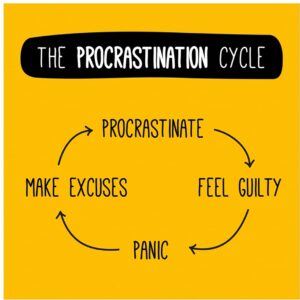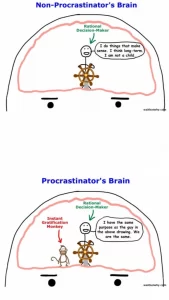Continua la collaborazione tra il liceo linguistico Cattaneo Dall'Aglio e Redacon tramite la rubrica "Speakeasy", curata direttamente dagli studenti dell'anno 2021-2022.
***

Do you ever delay a chore or task that you have to do? Are you feeling too anxious to face it? Don’t worry, the new three-minute rule is perfect for you.
Unlike the five-second rule, which is used when food falls to the ground, the three-minute one is scientifically proven. It’s really useful to overcome procrastination,which inevitably leads to stress and makes it even harder for you to face your day.
Instead of idling or eating ice cream on your couch, do what you have to do for at least three minutes. You might not finish the task, but it’s not really important. The point of starting from a few minutes is that, slowly, you’ll be able to do it for longer.
It might seem like it, but getting used to doing your most hated chore, won't make it even more unappealing, burdening or a source of further hesitation. This method was demonstrated to work for many other things, such as: fitness and health, phobias and social anxiety. If you’re scared of going to a party, try staying there for just a couple of minutes and you might end up enjoying the atmosphere and wanting to spend more time there.
But why is the rule just three minutes long? Not because three is the perfect number, but because of statistical datas.
Thanks to this recently discovered routine you’ll be able to overcome your daily fears and you’ll reach very satisfying results. You’ll start to experience a rewarding feeling of success.
There is also the five-minute rule, which is the amount of time to wait before talking about someone who has just left the room. Don't get confused though! The three-minute rule is related to perseverance, to keeping back from putting off tasks. It also makes it easier for people, who have a short attention span, to at least be able to stick to essential ideas. Long story short, don't exceed the three minute standard.
By reading the article titled ”The three-minute rule: the scientific way to tackle your most hated chores” we felt like the topic was universally relatable and it needs to be talked about more.
It’s not easy to get over the habit of procrastinating; postponing our duties is a direct response to anxiety. We try to avoid the feeling of distress connected to that specific action, but in reality we are just hurting and deluding ourselves. By lengthening the waiting time we may feel more at ease, but that will only last for a short time. The stress will come back and linger in your mind. Rather than benefiting from procrastination, you may start feeling uncomfortable because of the guilt and negativity that come with avoiding a task.
By not improving this state of mind, you won’t succeed in achieving your goals. Starting this journey of changing this bad habit is not an immediate process, but in the long run you’ll only notice the new and positive results.
(Nicole Castellani; Rebecca Mercati; Alessia Sanna, 4^QR)
***
Vi capita mai di indugiare su un’attività che dovreste fare? Vi sentite ansiosi all’idea di affrontarla? Non preoccupatevi, la nuova regola dei tre minuti fa al caso vostro.
Diversamente dalla regola dei cinque secondi, che si utilizza riguardo al tempo massimo da aspettare per poter raccogliere cibo caduto per terra, la regola dei tre minuti è scientificamente provata. É davvero utile per vincere la procrastinazione, la quale conduce inevitabilmente allo stress. Vi impedisce di affrontare la giornata in modo sereno. Invece di oziare o mangiare gelato sul divano, fate ciò che dovete per almeno tre minuti. Anche se non riuscirete a finire la vostra incombenza , questo non è l’importante. Lo scopo di cominciare da qualche minuto è che, lentamente, sarete in grado di svolgere l'attività più a lungo.
Nonostante lo possa sembrare, abituarsi a eseguire le vostre faccende più odiate non diventerà nuovamente un peso o motivo di ulteriore ansia. Questo metodo si è dimostrato funzionale per molte altre cose: fitness e salute, fobie e ansia sociale. Per esempio, se siete spaventati di andare ad una festa, provate a starci giusto per qualche minuto e probabilmente vi ritroverete ad apprezzare l’atmosfera e a volerci rimanere.
Ma perché questa regola prevede una durata di soli tre minuti? Non perché il tre è il numero perfetto in assoluto, ma in seguito ad osservazioni di dati statistici. Grazie a questa nuova routine sarete in grado di superare le vostre paure quotidiane e raggiungerete risultati alquanto soddisfacenti. Comincerete a sentire sensazioni di successo più gratificanti.
Esiste anche la regola dei cinque minuti, che è il tempo da aspettare prima di parlare di qualcuno che è appena uscito dalla stanza. Non confondetevi! La regola dei tre minuti è legata alla perseveranza e al trattenersi dal rimandare gli impegni. Rende anche più facile l’apprendimento di coloro che non riescono a mantenere l’attenzione per lungo tempo. In breve, non andate oltre ai tre minuti.
Leggendo con attenzione l’articolo “The three-minute rule: the scientific way to tackle your most hated chores” ci è sembrato che il tema riguardasse molte persone e che abbia bisogno di essere trattato maggiormente.
Non è facile superare l’abitudine del procrastinare, posporre i nostri doveri è una risposta all’ansia. Si cerca di evitare la sensazione di angoscia connessa a quell’azione, ma in realtà ci stiamo solo illudendo. Allungando il tempo di attesa, ci sentiamo più sollevati ma per poco tempo. Lo stress tornerà a tormentare la mente. Invece che trarre beneficio da questa situazione, ci si sentirà inquieti per la maggior parte del giorno, a causa del senso di colpa e della negatività che conseguono al fatto di evitare l’incombenza.
Non migliorando questa impostazione mentale, non si riuscirà a raggiungere gli obiettivi prefissati. Iniziare questo percorso di cambiamento non è immediato, ma porterà sicuramente a risultati positivi.
(Nicole Castellani; Rebecca Mercati; Alessia Sanna, 4^QR)









